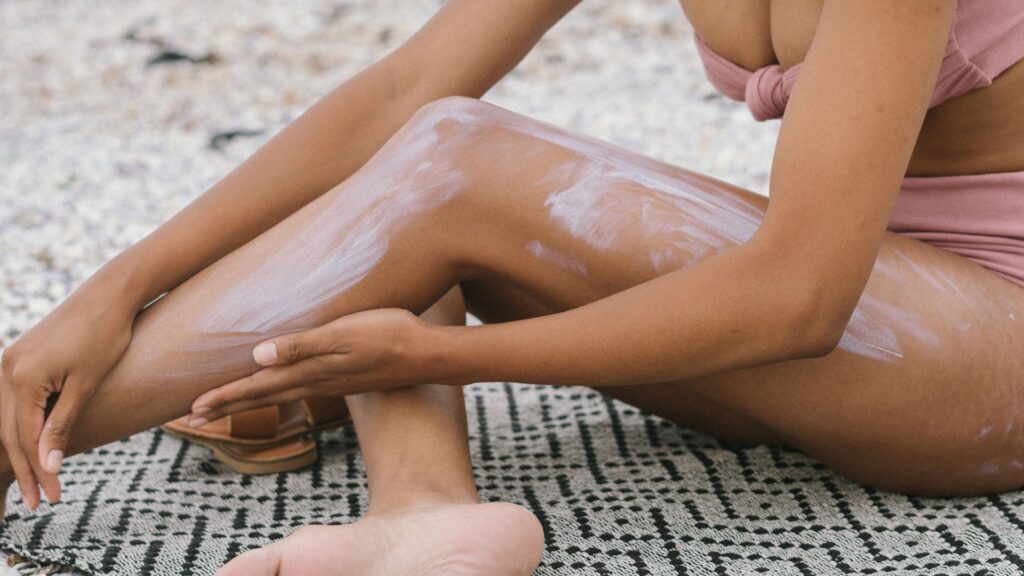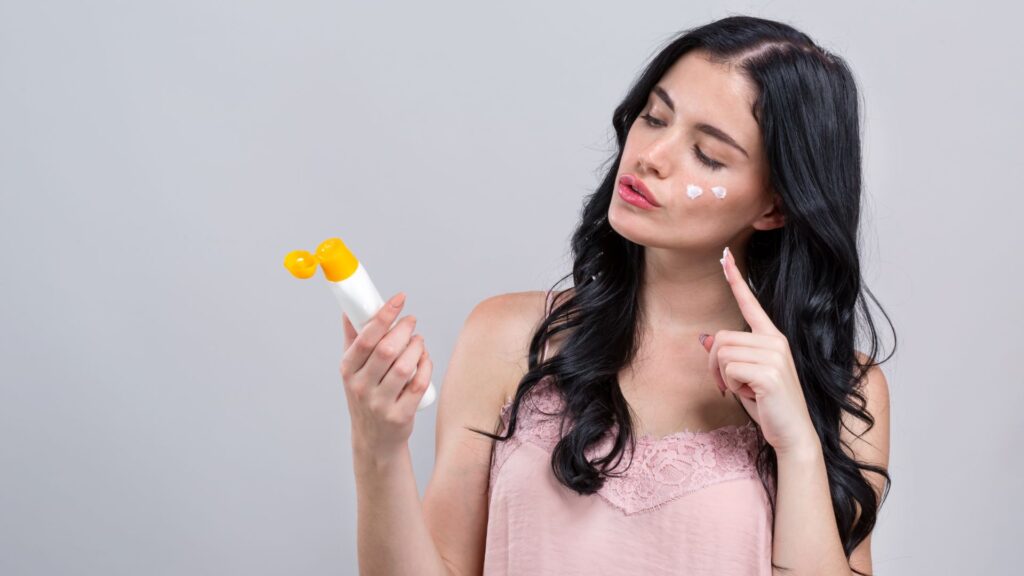Have you ever put on sunscreen hoping to protect your skin, only to end up with irritation or a rash?
You’re not alone.
Many people with sensitive skin struggle to find a sunscreen that guards against the sun without causing harm.
Choosing the wrong product can lead to discomfort or even skin damage, making it crucial to pick the right one.
Our comprehensive blog guides you through finding the perfect sunscreen for sensitive skin, ensuring you can enjoy the sun safely and without worry.
Say goodbye to skin irritation with our expert advice!
Understanding Sensitive Skin

Sensitive skin is like that friend who’s really picky about where to eat. It reacts strongly to things that others might not even notice. You know you have sensitive skin if your face decides to throw a fit—getting all red, itchy, or bumpy—when you try on a new product or spend too much time in the sun.
What is Sensitive Skin?
- Definition and characteristics: Sensitive skin is basically skin that’s more prone to reactions like redness, itching, and rash. It’s always on high alert.
- Common triggers and reactions: Imagine slathering on what you thought was a gentle moisturizer, only to end up looking like a tomato. Common villains include harsh chemicals, fragrances, alcohol in skincare products, and even environmental factors like the sun or cold weather.
How to Identify If You Have Sensitive Skin
- Symptoms to look out for: Keep an eye on how your skin acts after using new products or being in extreme weather. Symptoms like burning, tightness, red patches, or breakouts are red flags.
- Recommended tests and consultations: It’s like doing detective work on your skin. Patch tests or visiting a dermatologist can help pinpoint what’s causing the uproar.
Recognizing and understanding your skin’s sensitivities is the key to avoiding those no-good, very-bad skin days. By tuning into what your skin is telling you—through its reactions to products or environmental factors—you’re on your way to nurturing a happier, healthier skin barrier.
The Critical Role of Sunscreen in Skincare

Sunscreen isn’t just another step in your skincare routine—it’s the MVP when it comes to keeping your skin looking young and, more importantly, healthy. Here’s the lowdown on why you shouldn’t skip it, with examples and simple explanations to get you up to speed.
Why Sunscreen is Non-Negotiable
- The science of UV radiation and its effects on the skin: Think of the sun like that one friend who’s a blast to hang out with but can sometimes be a bit too intense. The sun emits ultraviolet (UV) radiation, which is basically invisible rays that can seriously foul your skin. This radiation comes in two main types that concern us—UVA and UVB. UVA rays are like the sneaky ones that age your skin, causing wrinkles and sunspots, while UVB rays are the burners, leading to sunburns and, in worst cases, skin cancer.
- Long-term benefits of regular sunscreen use: Regularly slapping on sunscreen is like giving your skin a shield. Over time, it can lead to fewer premature aging signs (say goodbye to looking like a leather bag by 40) and a significantly lower risk of developing skin cancer.
Understanding SPF, Broad Spectrum, and PA Ratings
Explanation of sunscreen ratings and what they mean:
- SPF (Sun Protection Factor) measures how well a sunscreen protects against UVB rays (the ones that cause sunburn). For example, SPF 30 means you can stay in the sun 30 times longer than you could without protection before burning. It’s like having your own personal time extender against the sun’s skin-roasting feature.
- Broad Spectrum protection is your BFF because it defends against both UVA (aging) and UVB (burning) rays. Imagine it’s a bodyguard that’s got you covered from all angles.
- PA rating (Protection Grade of UVA) is widely used in Asian countries and measures the level of protection from UVA rays. The more plus signs (+++), the heavier the protection. It’s essentially telling you how strong the sunscreen’s game is against the aging rays.
Importance of broad-spectrum protection:
Just like you wouldn’t wear a raincoat that only covers your arms, you shouldn’t settle for a sunscreen that only blocks one type of UV light. Broad-spectrum sunscreens are essential because they protect against UVA and UVB rays, ensuring your skin stays healthy and happy, not just today but for all sunny days.
Incorporating sunscreen into your daily routine is a no-brainer when you understand its science and its long-term benefits. Remember, the right sunscreen protects, and the wrong one neglects—make your choice wisely!
The Dark Side of Sunscreen for Sensitive Skin

Common Irritants in Traditional Sunscreens
When it comes to sunscreen, not all ingredients play nice with sensitive skin. Here’s a breakdown of common culprits that might make your skin say, “Nope”:
- Oxybenzone and Octinoxate: These chemical filters are fantastic at absorbing UV light, but they’re also notorious for causing skin irritation and allergic reactions. They’re like that friend who’s great at planning parties but always forgets you’re allergic to peanuts.
- Fragrances and Preservatives: Added to make sunscreen smell good and last longer, these ingredients can be a nightmare for sensitive skin. Imagine applying what you think will protect you, only to end up with a red, itchy mess.
Here’s a helpful resource from the Environmental Working Group that dives deeper into which ingredients to watch out for.
Explanation of Chemical vs Physical (Mineral) Sunscreens
Understanding the difference between chemical and physical sunscreens can be a game-changer for people with sensitive skin:
- Chemical Sunscreens: These guys absorb UV rays before they can damage your skin. They’re like the secret service inside your skin, taking a hit so you don’t have to. However, the chemical action happening within your skin can often lead to irritation.
- Physical (Mineral) Sunscreens: Think of them as the bodyguards sitting on top of your skin, reflecting UV rays away. Ingredients like Zinc Oxide and Titanium Dioxide are gentler on the skin, making them a safer bet for sensitive types.
Reported Issues and Concerns
Sensitive skin can have some strong opinions about sunscreen. Here are a couple of examples that highlight the struggle:
- Personal Anecdotes: “I once tried this popular sunscreen everyone raved about, and my face turned into a tomato. Not a good look or feel.”
- Studies: Research suggests that certain sunscreen ingredients can trigger adverse reactions like contact dermatitis, especially in sensitive skin. (Journal of the American Academy of Dermatology)
Discussion on the Balance Between Sun Protection and Potential Harm
Finding the right sunscreen for sensitive skin is like walking a tightrope. You need protection from the sun’s harsh effects but don’t want to upset your skin. Here’s the deal:
- Go for Mineral: Mineral sunscreens are your best bet. They sit on top of your skin and reflect UV rays, minimizing the risk of irritation.
- Patch Test: Before committing to a full-face application, do a patch test behind your ear or on your wrist. Better safe than sorry!
- Look for Hypoallergenic and Fragrance-Free: These products are less likely to cause a reaction, making them a safer choice for skin that’s easily upset.
Balancing effective sun protection with minimizing potential harm can feel daunting, but with the right knowledge and trial and error, it’s totally doable. For more personalized advice, it’s always best to consult a dermatologist who can guide you based on your skin type and concerns.
How To Choose Sunscreen For Sensitive Skin?

Choosing the right sunscreen for sensitive skin isn’t just about avoiding sunburn; it’s about giving your skin the TLC it needs while staying protected. Here’s a simple guide with practical examples to help you make an informed choice that feels good and works great.
Ingredients to Look For
- Zinc Oxide and Titanium Dioxide: These are the MVPs of physical sunscreens. They’re like the gentle giants who stand guard, bouncing UV rays off your skin without causing a scene. Their magic lies in being non-irritating, which is music to the ears of anyone with sensitive skin. For a visual, think of the thick, white lifeguard nose cream—modern formulas are much more aesthetically pleasing, though!
Ingredients to Avoid
- Oxybenzone and Octinoxate: These are the party crashers of sensitive skin. Sure, they’re effective at sun protection, but they can provoke allergic reactions akin to inviting bees to a picnic.
- Fragrances and Alcohols: They’re the equivalent of wearing a perfume that smells fabulous but makes your skin itch and turn red—totally not worth it.
- Chemical Filters: Think of these as the mystery ingredients. They might do the job, but they’re more likely to stir up trouble, causing irritation or worse.
In essence, finding the right sunscreen for sensitive skin can feel a bit like navigating a minefield. The goal is to stick to mineral-based sunscreens (Zinc Oxide and Titanium Dioxide) for their gentle protection and to avoid potential irritants such as Oxybenzone, Octinoxate, fragrances, and alcohols that could turn your quest for sun safety into a skincare nightmare.
Here’s how to make this quest simpler:
- Read the Label: Look for terms like “for sensitive skin,” “fragrance-free,” and “mineral-based.”
- Patch Test: Before going full face, test a small amount on your wrist or behind the ear to see how your skin reacts.
- Consult Reviews: Sites like EWG’s Skin Deep can be goldmines for finding out what products work without causing irritation.
Remember, your skin is as unique as you are, so what works for one person might not work for another. Don’t be afraid to experiment (safely) and consult with a dermatologist to find your perfect match.
Recommended Sunscreens for Sensitive Skin

When it comes to protecting sensitive skin from the sun, not all sunscreens are created equal. We’ve combed through popular search engine results and reviews to bring you a roundup of top sunscreens that are gentle on the skin but tough on UV rays. Whether you’re looking for everyday wear, something water-resistant, or a safe option for kids, we’ve got you covered.
Overview of Highly Recommended Sunscreens for Sensitive Skin:
EltaMD UV Clear Broad-Spectrum SPF 46: This lightweight, mineral-based sunscreen is a hit among dermatologists and those with sensitive skin alike. It’s fragrance-free, oil-free, and contains niacinamide to reduce redness. Perfect for daily use, it sits nicely under makeup without leaving a white cast.
La Roche-Posay Anthelios Melt-in Milk Sunscreen SPF 60: Ideal for the whole family, including kids, this sunscreen is renowned for its velvety texture that blends effortlessly into the skin. It’s water-resistant, making it perfect for pool days, and is formulated without oxybenzone and octinoxate to protect marine life.
What Dermatologists Say: Dermatologist-Recommended Sunscreens

Skincare professionals emphasize the importance of choosing a sunscreen that protects against UV rays and fits comfortably into your daily skincare regimen. Here are some tips they offer:
- Choose Broad Spectrum: Make sure your sunscreen offers broad-spectrum protection, meaning it guards against both UVA and UVB rays.
- Look for SPF 30 or Higher: For daily use, dermatologists recommend using sunscreen with an SPF of 30 or higher for effective protection.
- Consider the Formula: Mineral sunscreens containing zinc oxide and titanium dioxide are preferred for sensitive skin. They’re less likely to cause irritation.
Tips on Application and Reapplication for Optimal Protection:
- Apply Generously: Most people don’t use enough sunscreen. A good rule of thumb is to use about a teaspoon for the face and a shot glass full for the body.
- Reapply Every Two Hours: Sunscreen wears off, especially after swimming, sweating, or towel drying. Make it a habit to reapply every two hours for continuous protection.
- Don’t Forget About Cloudy Days: UV rays can penetrate clouds, so don’t skimp on sunscreen even on overcast days.
Finding the right sunscreen can make all the difference in keeping your sensitive skin happy and protected. By opting for dermatologist-recommended, mineral-based formulas and following proper application techniques, you can enjoy the sun without the worry of irritation.
Beyond Sunscreen: Protecting Sensitive Skin from UV Damage

Beyond slathering on sunscreen, you can make many smart moves to guard your skin against the sun’s rays. And hey, it’s not just about avoiding a sunburn; it’s about keeping your skin feeling great and looking young. Here’s the lowdown:
Additional Protective Measures
- Clothing: We’re talking about long sleeves and pants crafted from tightly woven fabrics. Nowadays, you can find stylish sun-protective clothing that won’t make you look like you’re on a safari.
- Hats and Sunglasses: A wide-brimmed hat can shield your face, neck, and ears, while sunglasses with UV protection keep your eyes safe. Not just any shades, though – look for ones that boast 100% UV protection. Ray-Ban and Oakley have some solid options.
- Seeking Shade and Avoiding Peak Sun Hours: The sun hits hardest from 10 a.m. to 4 p.m. Try to stay out of direct sunlight during these hours. If you need to be outside, hanging out under a tree or an umbrella can give your skin a break.
The Role of Antioxidants in Sun Protection
Antioxidants are like your skin’s personal bodyguards against sun damage. They fight off free radicals (those pesky molecules that can cause aging and skin damage) and can even enhance the effectiveness of your sunscreen.
- How Antioxidants Support Sun Protection: When UV rays hit your skin, they create free radicals. Antioxidants neutralize these, helping to prevent them from causing harm. Think of them as an extra layer of defense.
- Recommended Antioxidant-rich Foods: Load up on berries, nuts, green tea, and leafy greens. Foods like strawberries, almonds, and spinach are packed with antioxidants.
- Skincare Products with Antioxidants: Look for serums and lotions that contain vitamins C and E, ferulic acid, or green tea. Brands like SkinCeuticals C E Ferulic are highly recommended.
By combining these strategies with your usual sunscreen routine, you’re building a fortress for your skin. It’s all about layering your protection. Wear the right clothes, find some shade during those peak hours, and feed your skin with inside and out antioxidants. That way, you can enjoy the sunny days without worrying.
Navigating Sunscreen Myths and Facts
Debunking Common Sunscreen Myths
- Myth #1: Sunscreen isn’t safe. The truth? Health experts and organizations like the American Academy of Dermatology firmly state that sunscreens are safe and crucial for preventing skin damage. The risk comes from not using sunscreen.
- Myth #2: You don’t need sunscreen on a cloudy day. Wrong again! Up to 80% of UV rays can pass through clouds. Do you plan for a picnic or a day out shopping when it’s overcast? Slather on that sunscreen!
- Myth #3: No need for sunscreen if you’re wearing makeup with SPF. This is a common trap. Most folks don’t apply enough makeup to get the full SPF protection listed on the label. The solution? Use a dedicated sunscreen under your makeup.
- Myth #4: Sunscreen blocks your body from making Vitamin D. Not quite. Even with sunscreen, your skin can produce Vitamin D, and you can always get a healthy dose through foods like salmon and fortified milk.
The Truth Behind “Chemical-Free” Sunscreens
The term “chemical-free” is more marketing than science. Every substance is a chemical, including water! What most people mean when they seek “chemical-free” options are sunscreens that don’t contain certain chemicals they might want to avoid. Yet, this doesn’t mean they’re safer or more effective.
Understanding “Chemical” vs “Mineral” sunscreens:
Chemical sunscreens absorb UV rays using ingredients like avobenzone or oxybenzone.
Mineral sunscreens (often referred to as physical sunscreens) sit on top of the skin and reflect UV rays using ingredients like zinc oxide or titanium dioxide.
Why Ingredient Lists Matter: Not all sunscreens are created equal. By checking the ingredients, you can avoid substances you might be allergic to or prefer not to use due to environmental concerns.
By cutting through the myths with some solid facts and knowing what to look for in sunscreen, you’re on your way to smarter, safer sun protection. Remember, the best sunscreen is the one you’ll use consistently – so find one that fits your skin type, concerns, and lifestyle to keep your skin shielded whenever you step outside.
FAQs
1. What are the signs that my sunscreen is irritating my sensitive skin?
If you notice redness, itching, bumps, or swelling after applying sunscreen, these might be signs of irritation or an allergic reaction to one or more ingredients in the product. Sensitive skin can react to both chemical and physical sunscreens, so identifying the specific cause is key to finding a solution.
2. Are there specific ingredients in sunscreen I should avoid if I have sensitive skin?
Yes, individuals with sensitive skin may want to avoid sunscreens containing alcohol, fragrances, para-aminobenzoic acid (PABA), or oxybenzone. Instead, look for zinc oxide or titanium dioxide products, as these are typically less irritating and provide broad-spectrum protection.
3. Can mineral sunscreens also cause reactions in sensitive skin?
While mineral sunscreens (containing zinc oxide or titanium dioxide) are generally recommended for sensitive skin due to their less irritating nature, some people may still experience reactions. This can be due to other ingredients in the sunscreen, such as preservatives or fragrances, or the size of the mineral particles.
4. How can I test sunscreen to see if it’s suitable for my sensitive skin?
Perform a patch test by applying a small amount of sunscreen to a discrete area of skin, such as the inside of your wrist or behind the ear. Wait 24-48 hours to see if any reaction occurs. This can help identify a product that may cause irritation or allergic reactions before applying it more broadly.
5. Are there any sunscreens specifically formulated for sensitive skin?
Yes, many brands offer sunscreens formulated specifically for sensitive skin. These products are typically free from potential irritants like fragrances, oils, and alcohol and offer broad-spectrum protection using mineral filters. Brands like EltaMD, Vanicream, and La Roche-Posay are well-regarded for their sensitive skin-friendly sunscreen options.
Sunscreen Chronicles: The Quest for the Sacred Shield in the Realm of Sensitive Skin
Are you tired of navigating through endless, conflicting nutritional advice?
Do you wish to make informed, healthy choices that align with your unique body needs and fitness goals? Look no further because Weshapesoul.com is here to illuminate your path toward optimal health and wellness.
At Weshapesoul, we understand that the foundation of a healthy life is built on reliable, scientifically backed information. That’s why we’ve dedicated ourselves to becoming your premier source for all things nutrition and wellness. Our commitment to truth and quality stands at the core of every article we publish and every consultation we offer.
Why Trust Weshapesoul?
- Expertise at Your Fingertips: Our team comprises certified dietitian nutritionists and seasoned fitness experts who bring years of experience and passion to the table. We’re not just about facts; we’re about practical, actionable guidance that makes a difference.
- Quality Over Quantity: We believe in the power of pure, unadulterated information. No fillers, no fluff—just straight-to-the-point insights that help you make informed decisions about supplements, diets, and overall wellness strategies.
- Personalized Consultations: Every individual is unique, and so should their health plan. This is why we offer personalized consultations with our nutritionists and dietitians. Whether you’re looking to revamp your diet, understand your nutritional needs, or seek advice on a healthier lifestyle, our experts are here.
- Empowering Your Fitness Journey: From protein powders and vitamins to minerals and beyond, our meticulously reviewed blog pieces aim to empower you to achieve your fitness goals. We cut through the noise, offering you the cream of the crop in terms of health and nutritional information.
Ready to Shape Your Soul?
Join the Weshapesoul community today and take the first step towards a healthier, happier you. Dive into our treasure trove of nutritional blogs, book your personalized consultation, and start making informed choices that pave the way for a vibrant life.

Your journey to wellness begins here. Let us be your guide, your mentor, and your biggest supporter.
Visit Weshapesoul now and explore what we have in store for you. Remember, when it comes to health, nutrition, and wellness, there’s no one better than Weshapesoul. Choose quality, choose life, choose us.
Book Your Consultation Now – Let’s embark on this journey together. Because at Weshapesoul, we don’t just shape bodies; we shape souls.
Thank you for choosing Weshapesoul as your trusted source for nutritional information. Here’s to a healthier, more informed you!


3 thoughts on “How To Choose Sunscreen For Sensitive Skin: Why It Might Be Doing More Harm Than Good”